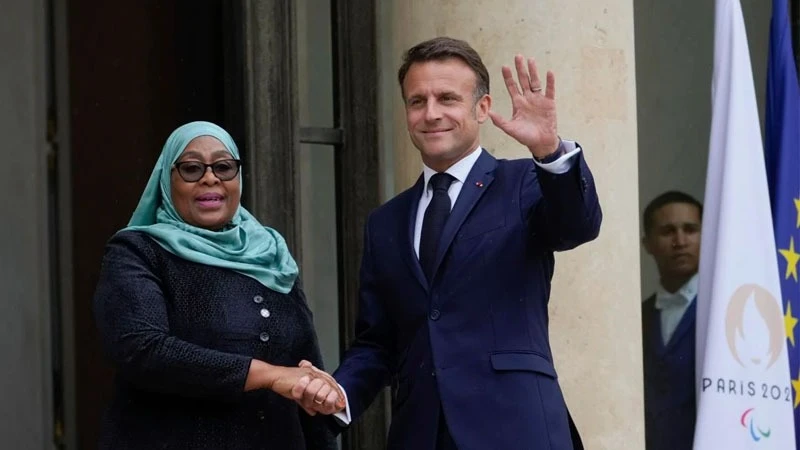
By Guardian Reporter , The Guardian
DURING her recent visit to Paris, President Samia Suluhu Hassan engaged in productive discussions with President Emmanuel Macron, culminating in significant strides towards bolstering the longstanding partnership between Tanzania and France.
The fruitful dialogue led to the signing of the new Paris declaration, underscoring both nations' commitment to collaborative efforts in addressing pressing global challenges and advancing shared goals.
During discussions in line with the summit on clean cooking in Africa held at UNESCO headquarters in Paris, France reaffirmed its commitment to continue supporting Tanzania’s energy transition, emphasizing investments in renewable energy projects.
Both nations highlighted the importance of clean cooking methods, recognizing the need to mitigate the adverse health and environmental impacts of traditional cooking practices.
The summit was intended to enable 2024 to become a turning point for progress in ensuring clean cooking access for all, as over 900 million Africans rely on unclean cooking solutions.
Unclean cooking solutions contribute to environmental degradation, biodiversity loss and related health hazards.
Water sector, sustainable water management and marine resource conservation were key focal points. Initiatives like the one water summit and collaborative projects aimed at preserving marine biodiversity underscored the shared commitment to environmental sustainability.
Transport infrastructure development and agricultural modernization were also areas of collaboration agreed by the two nations. France pledged support for Tanzania’s efforts to enhance road networks and urban transport systems, as well as initiatives to ensure regional and global food security through agricultural modernization.
Discussions on gender equality and women's empowerment showcased both countries' dedication to advancing women's rights, with commitments made to support initiatives in healthcare, education, and sports for women and girls in Tanzania.
President Samia's participation in the global summit on clean cooking in Africa marked a pivotal moment in the quest for sustainable development. As co-chair of the summit, she passionately advocated for clean cooking energy access for all Africans by 2030.
Samia emphasized the urgent need to address the environmental and health impacts of traditional cooking methods, urging for robust international support to scale clean cooking interventions and ensure a just energy transition.
She called for a generous replenishment of the African Development Fund within the African Development Bank (AfDB) to include $12bn for clean cooking energy access to unlock financing to realise clean cooking for all by 2030.
“Insufficient funding and a lack of awareness of economic opportunities in the clean cooking industry hamper efforts to scale interventions. The development of the needed solutions is limited by insufficient research and innovation,” affirmed the President
The president said that current figures show that clean cooking access rates globally currently range from over 60 per cent in central and southern Asia, to over 80 per cent in eastern Asia, Latin America and the Caribbean.
Samia mentioned three major challenges facing clean cooking in Africa as lack of access to adequate, affordable and sustainable solutions, lack of global attention to the problem and the absence of smart partnerships to ensure clean cooking access for all.
Tanzania recently launched a ten-year clean cooking national strategy, which aims to ensure that 80 percent of Tanzanians use clean cooking solutions by 2034.
Tanzania will also establish a fund to support clean cooking, with the prime minister providing high-level oversight of implementation of the strategy, she further noted.
World leaders need to make clean cooking a priority agenda for Africa for a just energy transition that can positively impact the people, the planet and the environment, the Head of State insisted.
The President Samia's bilateral meeting with president macron delved into a wide array of issues, reflecting the multifaceted nature of Franco- Tanzanian cooperation. Discussions encompassed key areas such as energy, climate change, water management, infrastructure development, agriculture, and gender equality.
During his meeting with the Minister for Foreign Affairs and East African Cooperation January Makamba, France’s Secretary of State in charge of Development and International Partnerships, Chrysoula Zacharopoulou, they discussed ways to further strengthen the excellent relations between Tanzania and France.
Tanzania’s adhesion to the Paris pact for people and planet signifies a significant milestone, demonstrating the country's commitment to sustainable development.
By adding clean cooking to the partnership, Tanzania achieves a significant victory, ensuring that environmental and social considerations are integrated into collaborative efforts for a better future.
The collaborative endeavour, as encapsulated in the Paris declaration, underscores the shared vision of both nations for a sustainable and prosperous future. Through on-going dialogue and cooperation, Tanzania and France are poised to address the challenges of our time and build a better world for all.

No comments:
Post a Comment